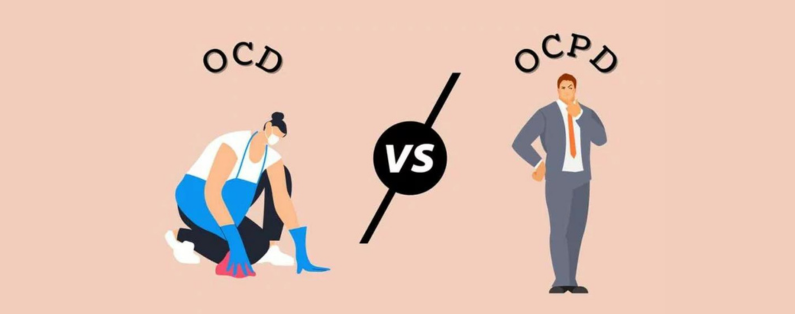Understanding the Difference Between OCD and OCPD: Ego-Dystonic vs. Ego-Syntonic
Obsessive-Compulsive Disorder (OCD) and Obsessive-Compulsive Personality Disorder (OCPD) may share a similar-sounding acronym, but they are distinct psychological conditions with significant differences in their definitions, traits, recognition, and underlying psychological dynamics. A key differentiator between the two is the concepts of "ego-dystonic" and "egosyntonic." In this article, we will explore the definitions of OCD and OCPD, the traits associated with each, how they can be recognized with examples, and why OCD is ego-dystonic while OCPD is ego-syntonic.

What Is OCD?
Definition: OCD, or Obsessive-Compulsive Disorder, is a mental health condition characterized by the presence of obsessions and compulsions. Obsessions are intrusive and distressing thoughts, images, or urges, while compulsions are repetitive behaviors or mental acts performed to alleviate the distress caused by the obsessions.
Traits of OCD:
1. Obsessions: People with OCD often experience unwanted and distressing thoughts, such as fear of contamination, harm coming to loved ones, or disturbing religious or sexual thoughts.
2. Compulsions: To reduce the anxiety caused by their obsessions, individuals with OCD engage in repetitive behaviors or rituals. For example, someone with contamination obsessions might compulsively wash their hands multiple times a day.
3. Ego-Dystonic: OCD is characterized as ego-dystonic because individuals with OCD typically recognize that their obsessions and compulsions are irrational and unwanted. They find these thoughts and behaviors distressing and intrusive.
Recognizing OCD:
Imagine someone who spends hours each day cleaning their house, even though it's already spotless. They might admit that their behavior doesn't make sense, but they can't stop themselves from obsessively cleaning due to their fear of germs. Or imagine someone who has an intrusive thought that they may pick up a knife and harm someone so they remove all knives from their kitchen and are afraid to be around them.
What Is OCPD?
Definition: OCPD, or Obsessive-Compulsive Personality Disorder, is a personality disorder characterized by a pervasive pattern of preoccupation with orderliness, perfectionism, and control. Unlike OCD, OCPD is about personality traits rather than intrusive thoughts and rituals.
Traits of OCPD:
1. Perfectionism: Individuals with OCPD have high standards for themselves and others, often insisting that everything must be done the "right" way.
2. Rigidity: They tend to be inflexible and insist on adherence to rules and schedules, often to the detriment of interpersonal relationships.
3. Ego-Syntonic: OCPD is considered ego-syntonic because individuals with this personality disorder see their traits and behaviors as consistent with their self-image. They may not recognize the negative impact their rigidity and perfectionism have on their life and relationships.
Recognizing OCPD:
Consider a person who spends an excessive amount of time organizing their closet and insists on having every item perfectly aligned by color and type. They may be highly critical of others who do not meet their meticulous standards, but they view their behavior as entirely rational and necessary.
Why OCD is Ego-Dystonic and OCPD is Ego-Syntonic:
The terms "ego-dystonic" and "ego-syntonic" are used to describe how individuals perceive their thoughts, behaviors, and personality traits:
1. Ego-Dystonic: In OCD, the obsessions and compulsions are ego-dystonic because the person recognizes that these thoughts and behaviors are inconsistent with their true self and values. They find them distressing and wish to be free of them.
2. Ego-Syntonic: In contrast, OCPD traits are ego-syntonic because individuals with OCPD see their perfectionism, rigidity, and control as an integral part of who they are. They do not perceive these traits as problematic and often believe they contribute to their success and orderliness.

In summary, while OCD and OCPD share some similarities in their acronyms, they are distinct conditions with different traits and underlying psychological dynamics. The crucial distinction lies in whether the individual perceives their thoughts and behaviors as unwanted and distressing (ego-dystonic in OCD) or as a fundamental part of their identity (ego-syntonic in OCPD). Recognizing these differences is essential for accurate diagnosis and appropriate treatment.